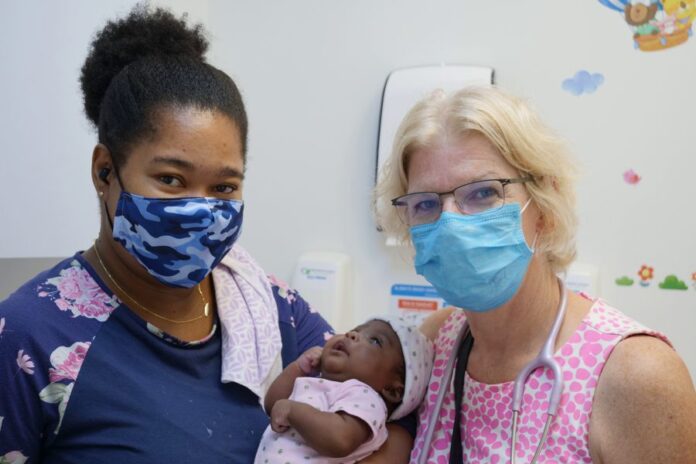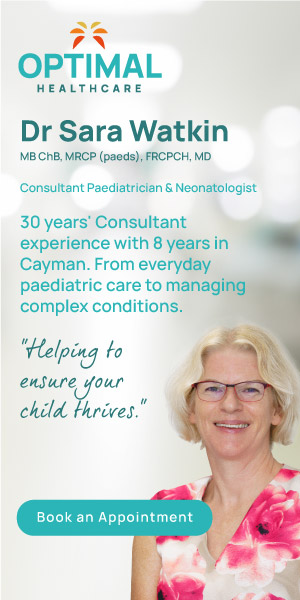Preterm birth is challenging at the best of times, when your baby arrives before, sometimes long before, you are expecting it. However, some occasions are more challenging than others, for instance when the new arrival comes amidst a pandemic, creating a new level of practical and emotional difficulty for the parents and care givers alike.
That’s the story of little Zoe, and her recent sister, Renae, both born prematurely during some of life’s most challenging times. Zoe, was born at just 26 weeks gestation, some 14 weeks early, in Cayman Islands Hospital in George Town, in March 2020, just as we headed into a perfect storm of conditions, and when transfer to a specialist centre like St Nicklaus Children’s wasn’t possible.
Dr Watkin: This was a scary time for parents and us. I am very used to caring for 26-week infants, having spent most of my working life caring for babies from 23 weeks gestation onwards, but we were all just discovering what Covid-19 was going to mean for us. We knew very little about the disease and nothing about whether it might carry extra risks for preterm babies, especially ones like Zoe, when they are already challenged by their degree of prematurity.
Zoe was born at a time when George Town Hospital was also facing the challenge of just how to care for patients in general and more importantly, how to keep people safe at a time when we were facing a disease that few understood. That meant restricting access to parts of the hospital and the NICU was one of those.
Having a preterm baby is obviously a traumatic experience when everything is normal but Zoe and mum found themselves separated for many weeks, a heart-wrenching time for her mum.
Zoe was born at a time when George Town Hospital was also facing the challenge of just how to care for patients in general and more importantly, how to keep people safe at a time when we were facing a disease that few understood. That meant restricting access to parts of the hospital and the NICU was one of those.
Having a preterm baby is obviously a traumatic experience when everything is normal but Zoe and mum found themselves separated for many weeks, a heart-wrenching time for her mum.
Bonding with Baby Zoe
Dr Watkin: Spending time with your new baby is important for both parents and baby alike and being born prematurely doesn’t alter that. However, Covid did and I really felt for what Mum was going through. What I tried to do was re-create some of what would normally be a shared experience by using phone and video technology, which as my husband always says, is not my strong suit! To try to ensure Mum was always fully aware, I spent time each day explaining all that was going on and how Zoe was doing.
We did daily video calls so Zoe and Mum could be together. One of my most striking and moving memories of this time, and a true testament to mum’s determination to be part of Zoe’s life, was that she would chat and sing to Zoe over our calls. I can also tell you that little Zoe’s face would light up when she was doing this.
Zoe’s Care Challenges
Dr Watkin: At 26 weeks, any baby is going to face a long, sometimes difficult journey. As a neonatologist, I also know that in these early stages, you need the utmost focus on getting things right. Being the tiniest bit off is something that can spiral into a host of more complex issues. For Zoe, that could have been a catastrophe because we were unlikely to be able to access a tertiary centre with complicated equipment like nitric oxide or advanced forms of ventilation. At the same time, I was in and out of protective gear multiple times per day, learning to do procedures in my newfound fashionwear, and the stress and newness of this is obviously very tiring. Our neonatal nurses in George Town were facing similar issues too.
Dr Watkin: In London, I always instilled in my juniors the importance of considering how delicate and partially developed the lungs are at this stage. Zoe’s lungs were not ready for their full-time occupation of providing enough oxygen. However, I know from experience that if you just ‘whack a baby on a ventilator’, although it solves the oxygenation challenge, it can have many lasting effects like life-long chronic lung problems or asthma. So, I will try to avoid ventilating unless it is absolutely necessary.
In Zoe’s case, we managed to avoid her being ventilated at all, carefully managing her with something more gentle called nasal SIPPV and supplemental oxygen. We actually sent her home just 3 days after her original due date, still on some supplemental oxygen, and on breast milk feeding. By that stage, home was where she needed to be and although some doctors aren’t all that comfortable, I have helped establish home oxygen care in the UK, and saw no reason why we couldn’t do this here.
Fast Forward
Dr Watkin: it is always a delight seeing Zoe. Very preterm infants are highly susceptible to various types of brain injury and the centre where I was Chief of Service, University College London Hospitals, was a world leader in its brain injury and prevention work. Zoe had regular scans right through her care and these were all normal. She did need two blood transfusions, intravenous feeding and then feeding through a nasogastric tube but despite the degree of prematurity, and with the facilities we have here on our tiny Island, we managed to get her home safely. She is now a bonny young lady who I take great pleasure in seeing and who her parents just adore.
And History Repeats Itself… with Renae
One of the risk factors for preterm birth is a previous preterm birth and Mum was going to be no exception. In August she gave birth to Zoe’s little sister, Renae, at 30 weeks gestation, ironically just as we were exiting our Covid-free bubble.
Dr Watkin: Yes, this was certainly a feeling of déjà vu. I have now had the privilege of managing 24 weeks of combined prematurity in the same family! Although Renae did need some supplemental oxygen, she was discharged home at 6 weeks of age. To put that in context, we managed to have her home 4 weeks before she was actually originally due, again on breast milk, and she’s just a beautiful young baby.
About Dr Sara Watkin
Dr Sara Watkin. a highly experienced, tertiary trained paediatrician and neonatal (newborn) specialist, based at Optimal Healthcare Ltd, with paediatric & neonatal admitting rights at George Town. She has 30+ years’ experience as a consultant in the United Kingdom, including as Chief of Service at the world-renowned University College London Hospitals. She has practised in the Cayman Islands since 2016 and cared for many preterm infants across that time, from as young as 24-weeks gestation, as well as babies with difficult birthing challenge, genetic issues and other complex problems, along with attending more than her fair share of normal deliveries too. She remains passionate and tireless in her pursuit of the best care possible for babies and children in the Cayman Islands.




